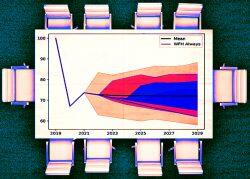An author of the so-called “urban doom loop” study is now spouting optimism about New York City, if not the office sector he savaged.
Columbia Business School’s Stijn Van Nieuwerburgh co-wrote “Work From Home and the Office Real Estate Apocalypse,” a 2022 paper that famously projected the city’s office stock to lose 28 percent, or $49 billion, of its value by 2029. Last year he revised that dire number to 44 percent.
The papers fed a hypothesis that an exodus of workers from commercial districts would erode tax revenue, forcing service cuts that would drive even more workers away.
But in an interview with Gothamist, Van Nieuwerburgh said the city has resisted the “urban doom loop” thanks in part to revived tourism and improved return-to-office rates.
The real estate professor mentioned two city initiatives that could get commercial real estate moving in the right direction: Mayor Eric Adams’ City of Yes proposal to boost housing stock and the “New” New York plan, which included 40 ambitious ideas.
The professor also mentioned interest in office conversions, about which he has also written a paper. Van Nieuwerburgh said conversion to residential should be the city’s “first choice” when dealing with empty buildings.
Van Nieuwerburgh contrasted New York City to San Francisco, saying that the Big Apple’s “well-diversified economy” is allowing for a better recovery than the tech-centric Bay Area. He also pointed to other factors that could keep the city vibrant, such as its cultural and restaurant scenes.
On the downside, the professor bemoaned the lapse of the 421a tax abatement and the state’s failure to replace it. Van Nieuwerburgh said a new version is necessary to support housing development, though he suggested it could be narrow in focus, such as a program for conversions.
Ultimately, he said, “We have our destiny in our own hands.”
— Holden Walter-Warner
Read more



